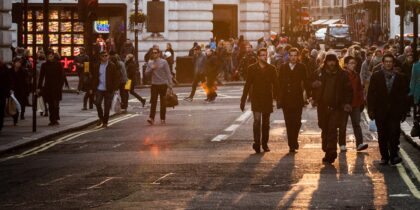By Kadra Abdinasir
Every year, Black History Month gives us an opportunity to reflect on the experiences and celebrate the achievements of Black communities in the UK, both in the past and present. As the month draws to a close, I wanted to share ways we can prioritise our wellbeing as we increasingly navigate conversations about Black history, racism, and discrimination in our society.
A lot of the narrative surrounding our history is often marked by the traumatic struggle against oppression. For many, learning about this history can be distressing and traumatising, particularly as this historical legacy continues to impact the lives of Black communities today. We have previously highlighted the impact of racism on Black people’s mental health which has been exacerbated by the disproportionate impact of the Coronavirus pandemic and the tragic deaths at the hands of the police in the US.
While we reflect and seek to address the challenges of the past and present, it’s important that we find time to prioritise and practice self-care. The term self-care can sound frivolous or even amorphous but it essentially means taking the time to do the things which keep us well. Below I share four ways I have been practicing self-care this month and hopefully beyond.
1. Embracing being Black in nature
Evidence suggests that spending time outdoors and in nature is good for our physical and mental health. Yet despite this, only 1% of Black, Asian and minority ethnic people visit national parks and they are also far less likely to participate in outdoor activities in nature. There are many reasons why this huge discrepancy exists besides the barriers to access, such as transport or financial barriers. Concerns about discrimination or feeling like you don’t belong in Britain’s nature sites is another worry many Black people (like myself) also have. However, there are a growing number of support groups such as Black Girls Hike and Steppers UK that are seeking to challenge this, because we do belong and it’s important for our wellbeing.
2. Developing a balanced ‘media diet’
This year especially, it has felt like negative news in the media has not only been increasing but is non-stop. From images of brutality against Black people to conflicting evidence about the ethnic disparities in Covid-19 outcomes, it has all felt too much at times. It’s important to remind yourself that you can control and limit the content you view. Whether it’s blocking or filtering words or content you find disturbing, or taking breaks altogether, reviewing the impact of my screen time has really helped me manage and reduce my consumption of bad news.
3. Creating boundaries by saying no, thanks
While the focus on tackling racism in our institutions and communities is very much welcome, engaging in the work itself can feel demoralising at times, particularly if it’s outside of your emotional capacity. Just because you’re Black or a Person of Colour doesn’t mean you have to share your lived experience of racism or find solutions to address it. You can create boundaries by simply saying no, findings ways to get involved that you enjoy or asking to be compensated for your time and expertise. Beyond this, it’s also okay to request time off to unplug or to avoid relationships with people who dismiss your feelings about racial inequality.
4. Focusing on sleep
Emerging insights suggest the pandemic is having a negative impact on our sleep. For many of us, our sleep routines and cycles have been thrown out of sync at one point or another during the pandemic. Previous studies suggest that short sleep is twice as prevalent amongst Black Brits compared to their White counterparts and this is due to a range of factors from occupation, financial stress or living circumstances. There are also concerns that the events of this year are leading to further ethnic disparities in sleep. However, doing regular exercise and reading to unwind before bedtime has helped me sleep better at night.
If you need advice or support:
- Black Minds Matter: https://www.Blackmindsmatteruk.com/
- The Black, African and Asian Therapy Network: https://www.baatn.org.uk/free-services/
- Samaritans: https://www.samaritans.org/how-we-can-help/contact-samaritan/
If you need urgent help, please call 111 or 999.








